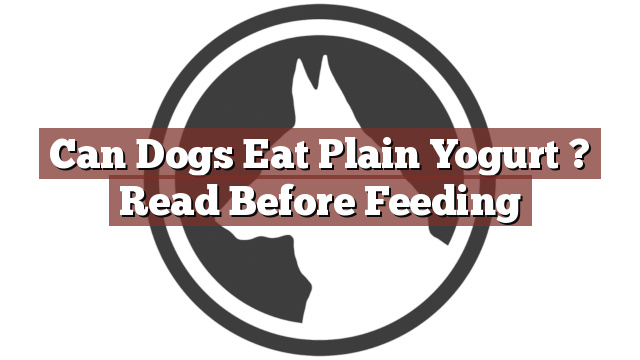Understanding Your Dog’s Dietary Needs
As a responsible dog owner, it’s important to understand your furry friend’s dietary needs. Feeding your dog a balanced diet is crucial for their overall health and well-being. While dogs primarily thrive on a diet consisting of meat, it’s natural for pet owners to question if they can add certain human foods to their dog’s diet. One such food that often comes up in discussions is yogurt. But can dogs eat plain yogurt? Let’s dive into this topic and find out.
Can Dogs Eat Plain Yogurt? Read Before Feeding
Can dogs eat plain yogurt? The answer is yes. Plain yogurt, without any added sugars or artificial sweeteners, can be a healthy addition to your dog’s diet. Yogurt is packed with beneficial nutrients such as protein, calcium, and probiotics, which can contribute to your dog’s overall digestive health. Probiotics, in particular, help promote the growth of good bacteria in the gut, aiding in digestion and boosting the immune system.
However, it’s important to note that not all dogs can tolerate dairy products. Some dogs may be lactose intolerant, which means they have difficulty digesting lactose, the sugar found in milk and dairy products. If your dog shows signs of digestive upset or discomfort after consuming yogurt, it’s best to consult your veterinarian before continuing to feed it to them.
Pros and Cons of Feeding Plain Yogurt to Dogs
Feeding plain yogurt to your dog has several potential benefits. The probiotics found in yogurt can help support a healthy gut flora, which is essential for proper digestion. Additionally, yogurt can serve as a healthy and low-calorie alternative to certain treats, helping to maintain your dog’s weight within a healthy range.
However, there are also a few cons to consider. While plain yogurt is generally safe for dogs, flavored yogurts or those with added sugars can be harmful. These additives can cause digestive issues and even lead to obesity in dogs. It’s crucial to read labels carefully and opt for plain yogurt when considering it as a treat for your furry companion.
In Conclusion: Considerations for Feeding Your Dog Plain Yogurt
In conclusion, if your dog can tolerate dairy products, plain yogurt can be a nutritious addition to their diet. The key is to offer them small amounts as an occasional treat rather than a significant portion of their daily meals. Remember to always choose plain yogurt without any added sugars or artificial sweeteners to avoid potential health issues. If you have any concerns or if your dog experiences digestive problems after consuming yogurt, it’s best to consult with your veterinarian for personalized advice and guidance. By understanding your dog’s dietary needs and making informed choices, you can ensure they enjoy a happy and healthy life.
Thank you for taking the time to read through our exploration of [page_title]. As every dog lover knows, our furry friends have unique dietary needs and responses, often varying from one canine to another. This is why it's paramount to approach any changes in their diet with caution and knowledge.
Before introducing any new treats or making alterations to your dog's diet based on our insights, it's crucial to consult with a veterinarian about [page_title]. Their expertise ensures that the choices you make are well-suited to your particular pet's health and well-being.
Even seemingly harmless foods can sometimes lead to allergic reactions or digestive issues, which is why monitoring your dog after introducing any new food item is essential.
The content provided here on [page_title] is crafted with care, thorough research, and a genuine love for dogs. Nevertheless, it serves as a general guideline and should not be considered a substitute for professional veterinary advice.
Always prioritize the expert insights of your veterinarian, and remember that the health and happiness of your furry companion come first.
May your journey with your pet continue to be filled with joy, love, and safe culinary adventures. Happy reading, and even happier snacking for your canine friend!

